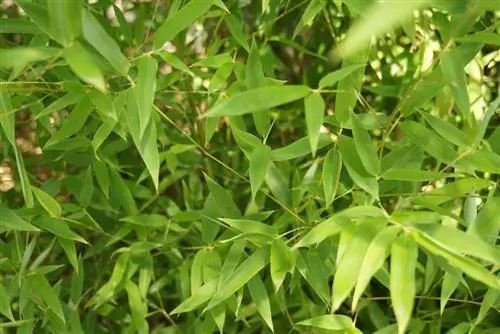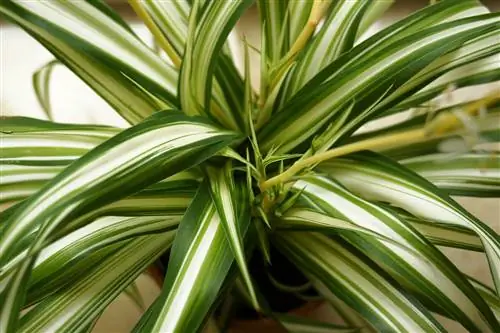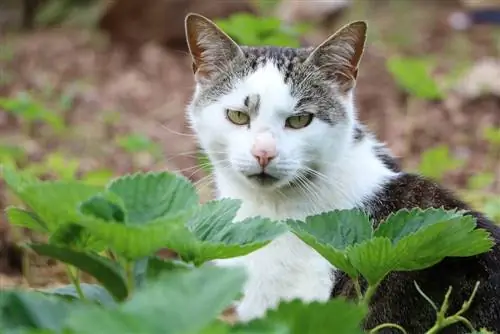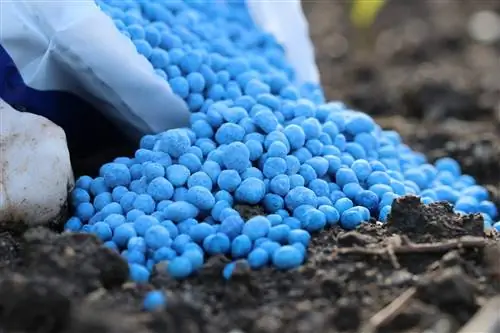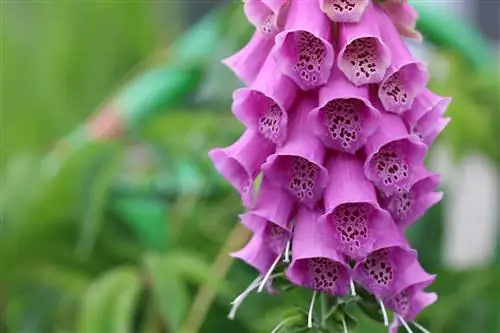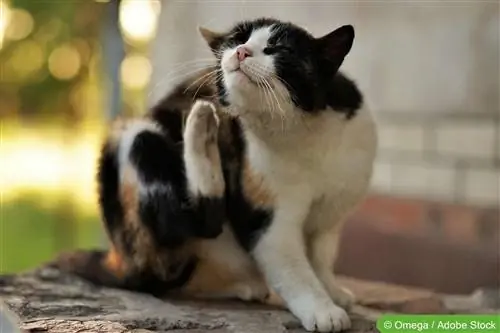- Author admin [email protected].
- Public 2023-12-17 03:39.
- Last modified 2025-06-01 06:48.
First of all: There are hardly any species of bamboo that are actually poisonous to humans and animals. And even in poisonous species, the toxic substances are mainly found in the raw sprouts and seeds. Bamboo contains hydrogen cyanide, which it uses to protect itself if it is injured by predators. This means that if a bamboo is damaged, it releases hydrogen cyanide and thus blocks cellular respiration - similar to what happens with carbon monoxide.
Bamboo - An Asian plant with a long-standing tradition in the garden
As a dog or cat owner, you don't have to worry about any danger to your pets, as bamboo is not on the menu for dogs and cats. So there is no reason for the animals to injure the plant and thereby initiate the release of hydrogen cyanide. The Asian plant with its wood-like stems can easily serve as a fence, as a decorative accent on the property or as a privacy screen for your seating area or garden pond. All bamboo plants available in stores and garden supplies are non-toxic and therefore perfect for your property.
Note:
The most poisonous part of a bamboo plant is its flower. Bamboo blooms in extremely rare cycles, every 80 to 100 years. So it's unlikely that you're taking a risk by allowing the bamboo to bloom in your garden.
Keep pets away from bamboo plants
While a dog is less interested in garden plants, cats mainly nibble on the young shoots. Reminiscent of cat grass, fresh bamboo shoots are considered edible and can easily end up in the cat's stomach. Therefore, before purchasing bamboo plants, you should find out carefully whether it is a non-toxic or a poisonous plant, whether it has been chemically treated or whether it has been left in its natural state. In garden centers and on the Internet you can find bamboo that
- breeded here
- a non-poisonous variety
- not chemically treated
- therefore safe for your pets
Nevertheless, you should keep dogs, cats and small children away from the seeds, fresh shoots and the rather rare flowers of the plant. When the bamboo sprouts in spring, you can protect it with a fence and thereby prevent your cat from ingesting an excess of hydrogen cyanide and suffering he alth problems from eating the fresh sprouts. As with most plants, the same applies to bamboo: the toxic properties are related to the amount of shoots consumed. If a cat briefly nibbles on a bamboo shoot, you don't have to worry about symptoms of poisoning. The situation is different when a whole plant is nibbled and the pet “frees” it of all fresh shoots.
How can a food plant be poisonous?
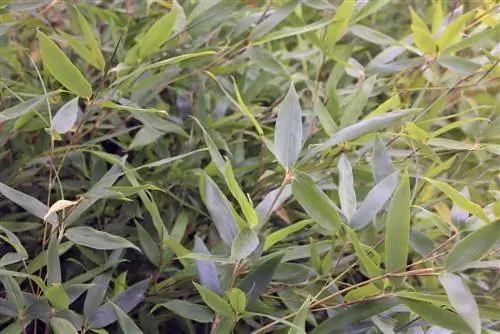
Bamboo is part of practically all dishes in Asian cuisine and is one of the plants that is responsible for the typical taste of the dishes. These are, of course, non-toxic varieties and are mostly cooked and not eaten raw. You don't have to miss out on delicious bamboo shoots in your salad, but you shouldn't harvest them from your own garden. Commercially available sprouts are free of hydrogen cyanide and are therefore ideal for your he althy diet. The situation is different with a few species whose hydrogen cyanide content is very high and therefore dangerous to your he alth. However, you would have to consume a larger amount to notice the undesirable effect and poison yourself with bamboo.
Bamboo and pets - tips for gardeners and plant lovers
You should not plant even non-toxic bamboo species in outdoor enclosures for your pets. In addition to dogs and cats, rabbits, ducks, geese and ostriches are also interested in the fresh green of the plants. For strong and dense growth, it is necessary that the bamboo is not damaged during its growth phase. Bamboo plants and pets can live in harmony on your property if you follow a few rules in planting and plant protection.
- In the budding phase, keep your animals away from the fresh greenery.
- Prevent the possibility of a dog or cat injuring the trunk.
- Place the bamboo in an animal-safe location.
- Check the fresh shoots every day.
- Observe your pets carefully and notice any he alth changes immediately.
You can find out which type of bamboo is non-toxic and therefore ideal for your garden at garden centers or look at the list of plants suitable for pet owners. However, it is important that you make sure that your animal does not nibble on the bamboo or include the seeds or raw sprouts in its diet, even with non-toxic varieties. If you are interested in unusual species of bamboo that are not common in this country, you should find out about the toxic content and generally avoid dogs and cats coming into contact with the plant. This also applies if you import your bamboo directly from Asia or choose a plant whose origin is unknown or whose species is not specifically defined.
Important:
Get as much information as possible about the origin and type of bamboo. Even though there are mainly non-poisonous bamboo species available in this country, you should find out whether your plant is grown in Germany or Europe.
Pets and bamboo do not have to be mutually exclusive
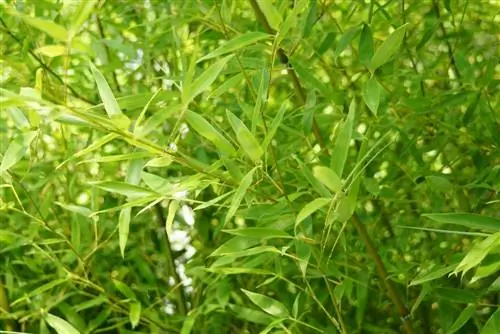
If you choose the type of plant carefully and pay close attention to your pets, you can easily choose bamboo in the garden. Dogs are far less interested in the fresh green shoots, while cats like to nibble on them and should be kept away. Even if your cat is an outdoor cat, you don't have to do without bamboo. During the sprouting period, you can protect the plant - and therefore also your cat - by making access more difficult and making the bamboo uninteresting for curious cats. Of course, the same applies to small children. You can be sure that your child won't put any bamboo shoots in their mouth.
Tip:
Even if hydrogen cyanide is proven to be harmful to he alth, larger amounts are necessary for real symptoms of poisoning. Bamboo plants sold in garden centers are non-toxic and therefore pose no risk to your well-being or the he alth of pets. You can use the beautiful Asian plants in a variety of ways on the property and create an ambience that inspires you and does not pose any dangers.
No reactions have been observed in pets with the types of bamboo available in this country. Since it is a fibrous plant, the ingested parts are usually excreted whole and without leaving any damage. If the cat nibbles on a poisonous bamboo, this will cause problems with the cells and cause a slight dizziness. This reaction is due to the hydrogen cyanide, which acts against cellular respiration and deprives the blood of oxygen. The temporary lack of oxygen causes a staggering gait. A veterinarian only needs to be consulted if very large quantities are consumed. As a rule, the symptoms of dizziness subside within a few minutes and the cat vomits the plant parts it has ingested.

